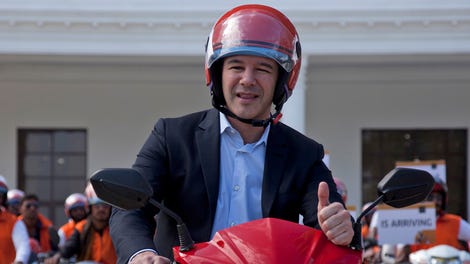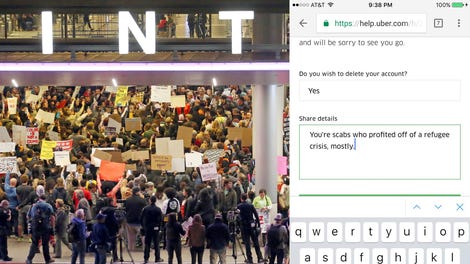
The past week brought a crush of protests across the U.S. in response to an executive order from President Donald Trump that effectively banned Muslims from seven countries from entering the U.S. Against this backdrop, on Saturday, ride-hailing giant Uber—valued at an insane $69 billion—entered the picture.
At JFK Airport in New York City, taxi drivers staged a strike for an hour to protest the immigration ban, drawing thousands of protesters and ensnaring the facility with a significant backload of traffic. That’s fine.
Advertisement
Advertisement
What isn’t fine was Uber’s response to drop surge pricing at JFK, a move that—inadvertent or not—came across as an attempt to break the taxi drivers’ strike. CEO Travis Kalanick quickly issued a statement, saying the company would compensate drivers affected by Trump’s ban and that its move wasn’t aimed at breaking the strike. But his remarks were merely a toothless gesture, an attempt to save face by a company whose existence rests on perpetually saving face.
So, Uber riders, and there are plenty, implored others to delete the app. It was simple. #DeleteUber. Many did. The backlash was so intense that Uber apparently had to cobble together a new automated system to address the onslaught of deletion requests from riders.
At a time of mounting uncertainty, witnessing such a collective force of action is, at the very least, reassuring. And that’s why it was utterly baffling to read a piece on Timethis weekthat suggested to you, politely, “Don’t Delete Uber — Yet.” Here’s a cut.
Sponsored
And it’s possible that backlash to Uber over this one incident could be part of a greater animosity towards the company. Not only is Kalanick a member of Trump’s economic advisory group, but the company has also faced critique in the past for policies including how it treats its drivers and how it manages its surge pricing.
But targeting Uber in this instance was likely unfair. Instead of pointing to how the company poorly responded to an anti-Trump protest, perhaps the public should focus on how the company responds to Trump’s actions. Much of that has yet to be seen, though Uber has promised $3 million will go into a legal fund to help drivers affected by the ban.
Moreover, the #DeleteUber outrage distracts from the real issue: that the new U.S. president just shocked the world with an unprecedented, potentially unconstitutional order, causing upheaval and chaos in government offices, airports and homes around the country.
Setting aside the comically weak qualifier that it was “likely” unfair to criticize Uber for Kalanick’s decision to sit on Trump’s economic advisory council, the #DeleteUber protest literally stemmed from outrage over the disturbing Muslim ban. Kalanick is a powerful individual, a guy directly associated with someone who had ushered in a chaotic, disgusting policy that led to the absurd detainment of an 88-year-old blind man and a five-year-old child, among others.
Advertisement
The column, in sum, argued that Protests Are Bad. Another cut:
But next time, instead of getting mired in one-off corporate snafus, those who oppose Trump’s policies may find it more beneficial to channel their energy toward the real culprit and into action that promotes their goals.
If the goal was to call attention to the ban and Very Important People associated with the president who implemented the policy, well, hey, turns out it worked—because on Thursday, Kalanick relented and announced he was stepping down from Trump’s economic advisory council, which also includes Tesla founder Elon Musk.
Why? Protests work. In the face of an authoritarian president, a Congress that seems more than willing to walk in lockstep with him, a judicial system seemingly set to be equally as compliant and a gargantuan sum of unchecked money that has, and continues to, pervade our political process, the one thing everybody can lean on—for now—is the right to protest, however they please. Hold a sign, stand there silently, organize one yourselves, whatever works for you.
Advertisement
Advertisement
Kalanick admitted they work, even if he didn’t state it directly.
“Joining the group was not meant to be an endorsement of the President or his agenda but unfortunately it has been misinterpreted to be exactly that,” he said in an email to staff, announcing his departure from the council.
Yes, his comment is a back-handed sleight to riders who use his app, and doesn’t seem genuine whatsoever (it’s hard to imagine that anti-regulatory Uber can’t get behind a president who hopes to significantly cut regulations), and it disregards that by accepting a seat at the council’s table that Kalanick must’ve believed Trump was the right guy to not only listen to his ideas, but also possibly put them into action. Above all, Kalanick is ultimately conceding here that protests work. The weight of #DeleteUber was too much to handle, so he backed off.
Advertisement
Maybe it’s only a minor victory. But Kalanick’s decision is a reassuring reminder that, after a whirlwind two weeks, protests still get victories.
















